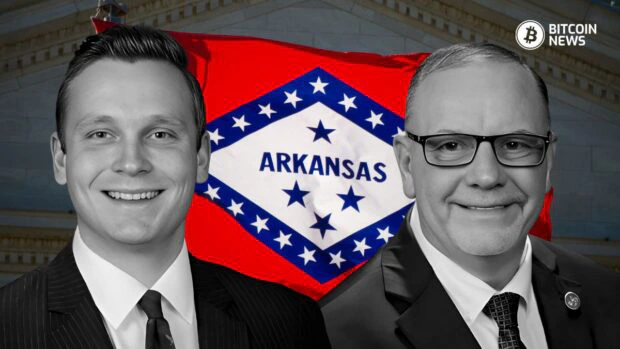In a flurry of legislative activity, Arkansas lawmakers are wrestling with the regulation of Bitcoin mining within the state. The debate revolves around balancing the economic benefits of digital assets mining with concerns over noise pollution, energy consumption, and potential ties to foreign entities.
Arkansas Legislations: Background
The debate surrounding digital assets mining in Arkansas has been fueled by various factors, including noise pollution, energy consumption, and foreign ownership of mining operations. Arkansas initially passed Act 851 in 2023, which limited the state and local governments’ ability to regulate mining operations. However, this move sparked a backlash.
House Approves Two Bills
The Arkansas House recently approved two bills proposing stricter regulations on digital assets mining, including Bitcoin. These bills, sponsored by Rep. Rick McClure and Rep. Jeremiah Moore, aim to address some of the concerns raised by Act 851. McClure’s bill focuses on noise limits and restrictions on foreign ownership, while Moore’s bill seeks to license mining operations and impose sound limits.
During the House debate, Rep. David Ray expressed concerns about the noise and proximity of mining operations to residential areas. He emphasized the need for targeted regulation that addresses these specific issues. However, Rep. Josh Miller’s six resolutions, which aimed to address noise, foreign ownership, and excessive energy usage, failed to pass the House.
Ray stated:
“I can’t imagine what it’s like to live next door to that facility […] We can do a better job by vetting these individual resolutions and picking one or two to refer to committee that address these issues that we know Arkansans are dealing with.”
Senate Consideration
In the Senate, lawmakers discussed the broader implications of amending Act 851. The debate centered on whether changes should be made and the level of detail required in these amendments. Some senators raised concerns about the waste generated by Bitcoin mining and its impact on the environment.
Rep. Josh Miller, a key figure in the push for regulation, sponsored six resolutions aimed at addressing various aspects of Bitcoin mining. Despite his efforts, these resolutions failed to garner enough support in the House. Miller expressed disappointment but emphasized the importance of addressing the concerns raised by Bitcoin mining operations.
He stated:
“Nobody is in more of a hurry to wrap this up and get back to work than me […] But sometimes you have to deal with things. If you don’t agree with me, go sit next to one of these residences that is by a crypto mine.”
On the other hand, Rep. Rick McClure and Rep. Jeremiah Moore sponsored resolutions that successfully passed the House. These resolutions focus on imposing noise limits on Bitcoin mining operations, prohibiting ownership by certain foreign entities, and requiring licenses for the operations.
Rep. McClure highlighted the need for basic regulations on Bitcoin miners, stating:
“Don’t we wish we had the information that we have today when we originally voted on this? It would have been a different day.”
Criticism and Opposition
While some lawmakers supported the passage of these bills, others voiced concerns about their specificity and timing. Rep. David Ray expressed skepticism about addressing Bitcoin mining during a fiscal session and called for more selective consideration of bills. He added:
“I think we ought to take up ones that address issues that we have a consensus about dealing with. When it comes to this issue, I think there are some things that we have consensus on.”
In defense of his proposals, Rep. Miller argued that they would provide a starting point for discussions and potential amendments in committee. Despite the criticisms, he remained committed to addressing the issues surrounding Bitcoin mining.
Rep. Moore, who has been vocal about the negative impact of Bitcoin mining on communities like DeWitt, emphasized the need for oversight and regulation. He expressed concern about the influence of billion-dollar corporations and vowed to stand up for affected communities.
Moore called DeWitt a good town that “you would be proud to grow up in.” He added:
“If there is a bad actor and there are many […] How is a small town going to stand up to a billion dollar corporation?”
Broader Context and Environmental Concerns
The debate over Bitcoin mining extends beyond Arkansas, with similar discussions taking place worldwide. Concerns about the environmental impact of mining, including energy consumption and electronic waste, have prompted calls for stricter regulations in various jurisdictions.
Related reading: Norway Tightens Grip on Bitcoin Miners by Raising Bar for Data Centers
Globally, countries like Paraguay are also grappling with the legal and environmental dilemmas posed by Bitcoin mining. Paraguayan lawmakers proposed a temporary ban on mining activities due to concerns about power theft and interruptions to the electricity supply. Bitcoin mining’s resource-intensive nature draws scrutiny for its environmental impact. However, various studies have shown that Bitcoin mining has a net positive effect on the environment, and helps stabilize power grids.
Related reading: Bitcoin’s Net-Positive Environmental Impact: List of Recent Studies
Interestingly, Paraguayan senators have halted progress on the proposed mining ban, with discussions now focusing on leveraging excess energy from hydropower plants for Bitcoin mining operations, instead of selling the energy to Brazil at a loss.
Miners Facing Challenges
Miners are facing additional challenges, including the upcoming Bitcoin halving. This event could lead to increased selling pressure and a potential downturn in the Bitcoin market. Analysts warn of a “summer lull” in trading as miners adjust to the new market conditions.
Markus Thielen, head of research at 10x Research, predicts that Bitcoin markets could face significant challenges in the coming months due to increased selling following the halving.
He said:
“The overhang from this selling could last four to six months, explaining why Bitcoin might go sideways for the next few months — as it has done following past halvings,”
Conclusion
As Arkansas lawmakers continue to navigate the complex landscape of Bitcoin mining regulation, they must balance the economic opportunities with environmental and social concerns. The approval of two bills could mean trouble for Bitcoin miners, but the debate is far from over. The Bitcoin community in Arkansas is following the news as legislators work towards finding a solution that protects both citizens and the burgeoning Bitcoin industry.










